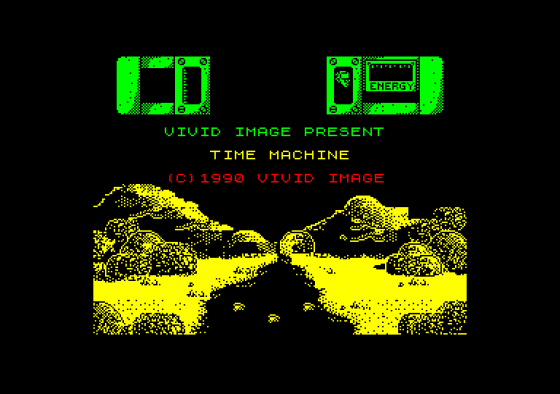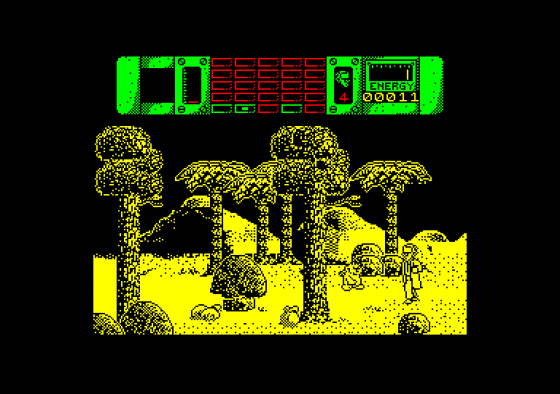
Amstrad Action
 1st November 1990
1st November 1990
Categories: Review: Software
Author: James Leach
Publisher: Activision
Machine: Amstrad CPC464
Published in Amstrad Action #62
Haven't we seen this before? It's a game about a mad old Prof who shuttles back and forth across the fabric of space-time willy-nilly, distorting the laws of physics and reason, whilst remaining wacky and somewhat absent minded. Well, yes we have. The Back To The Future games, to be precise. But the time-warpy feeling of deja vu ends there. Time Machine has a totally different style, and totally different goals.
The old guy you control is called Professor Potts. He's as mad as two spoons, but obviously isn't completely useless because he has perfected a time-travelling device. One day he is working on this little gadget, when there's a terrorist attack. Of course, Potts tries to ignore this rude interruption, but a stray explosive hits his machine, and within a nanosecond the Prof is whisked, complete with lab coat, NHS specs and dandruff, back to prehistoric times.
What is he to do? No pubs, burger bars or Children's BBC... How is he to survive? Potts rashly decides to interfere with evolution. But anyone who knows anything about time travel will know that this is *extremely* dangerous [So don't try it at home - Ed]. But if you are trapped 10 million years in the past, it's your only chance. If Potts can guide Earth's evolution safely to the present day, he'll be able to stop those meddlesome terrorists from bombing his time travel widget in the first place.
The first time zone is pre-Ice Age. It is nice and warm and there are pretty volcanoes dotted around, spewing out fiery molten lava blobs, which it's best to avoid. There are also palm trees, oily swamps, and small teddy bears. Don't laugh; these bears are your ancestors! They are very cute and harmless (so what went wrong?). Anyway, you must ruin this paradise by causing an Ice Age, to allow evolution to progress.
Firstly, you must drop large rocks over deep vents in the ground to block off the emerging heat. Easy enough, but the poor teddies start feeling the cold, so you must transport them to somewhere warm and safe.
Luckily, you were dumped back in the past with a few useful items. One is a stunner ray, the others are small travel pods. These can be left in strategic locations and you can travel between them at will. This saves a great deal of legwork. You can also transport other items from screen to screen too, and the devices will even work from between Timezones. Hmmm. Very useful indeed.
If you manage to steer the planet into a decent Ice Age, you can proceed to Timezone Two. Here, you must heat everything up again. It's a good idea to start by removing the rocks over the vents (yes, two million years later they're still there!).
There are a great many other tasks to complete before you have set evolution going in the right direction. The job is made harder because there are yetis around who would dearly love to eat you. Avoid or stun them, and try and work out what you must do to proceed to Timezone Three.
When you do, you'll find that the teddies have evolved into cavemen. They are puzzling out the mysteries of circular motion, and would very much like a helping hand. You, of course, being an extremely brainy Professor, understand all about such technical things as wheels, so you should be able to offer assistance.
Zone Four sees you at a somewhat obscure period in history. There's a rather daunting giant who is guarding a bridge. This is the key to vital oil reserves. You have to (gulp!) kill the giant to free the oil. What for is still a bit of a mystery. Like all the other levels, it isn't as easy as it sounds. There are more than a few complications, and, quite understandably, the giant doesn't take kindly to attempts on his life. If you manage all this, you are rewarded with your arrival back in the present day. You can start repairing your time machine, using your ability to dash back and forwards through the Timezones to collect any items you might need.
Time Machine is very different from either of the Back To The Future games. Any resemblance of Prof Potts to Doc Emmett is forgotten once you start playing the game. And there's certainly no sign of either a diminutive permanent adolescent or a dodgy, unpainted Irish sportscar.
The playing area is five screens wide. Not much, perhaps, but they change a good deal over the five Timezones and ten million years that the game spans. You must keep an eye on a lot of the previous screens because, having set evolution into motion, it could all go wrong, leading to all sorts of problems in later millenia. So you'll have to dash back and forth, steering the course of events. An example can be seen if you plant an apple in one zone. If you travel to the same place in a later zone, you'll bump into a fully grown apple tree. Such enormous power must be used carefully.
There are lots of objects and animals around, and the game has an arcade element, as you negotiate your way past falling fireballs from the volcanoes and violent prehistoric creatures. A pteranodon flies through the sky of the first zone. His (or probably her, thinking about it) eggs are on the ground below, and if you fire your stun-ray at them, she'll swoop down angrily and carry you off across the other screens at top speed.
Terrifying though this is, you can use it as a quick form of transport. Just press Fire when you get to the screen you want, and you'll drop safely to terra firma.
But what's it like? First the bad news. Time Machine is a largely one-colour Speccy port. The sprites are large, but could be smoother; the 3D-ish effects as you walk in and out of the screen work nicely, without too many annoying collision detection errors. Control of the Professor can be a little woolly, but this could be put down to the fact that the old geezer is getting on, and his co-ordination isn't what it used to be.
There is a lot of other movement on-screen; the teddy bears in the first zone wander about engagingly (until you zap them with your stun-ray), and the corresponding animals on other levels move similarly. The yetis and giant further on in the game are large (for a Spectrum port) and add much to the atmosphere.
Each Timezone is a different overall colour, so it is easy to remember where (or when) you are. There is also an information display panel overhead, which tells you which object you are examining, which screen you are on and which zone you are in. It also shows your energy level and your stun-gun recharging level.
Again, the graphics are clear, but are very reminiscent of Sir Clive's little machine. There is no sound whatsoever in Time Machine. This might seem like a major deficiency, but because of the nature of the game it takes a while for you to notice. The silence isn't deafening, but spot effects or a tune you could switch on or off would have added an indefinable, er, something to the program.
Time Machine is a different sort of game. It combines joystick dexterity with a great deal of puzzle-solving and logic. The combination works well, and to a great extent overcomes the lack of sound and the Spectrum graphics. However, the game is very difficult. You can slowly progress through the levels, but the occasional quirk will have you stumped for aeons.
This form of time travel can get very frustrating as you puzzle your life away, but if you're not too bothered by Speccy ports and silence, and if you enjoy being flummoxed, step into the Time Machine and head back to the dawn of history.
First impressions are rather grim. An outrageous Speccy port and a game with only 25 screens! Play it a bit longer, though, and you find yourself growing more and more enmeshed in a highly complex game.
Trigger an ice age.
Graphics 67%
N. The Spectrum That Time Forgot.
Sonics 0%
N. Great game to play in a library.
Grab Factor 65%
N. Bit difficult to fathom at first.
Staying Power 81%
P. Great if you're a lateral thinker...
Overall 76%
A timeless concept to keep you going for ages.
Time Machine



Second Opinion
First Day Target Score
Verdict
Other Reviews Of Time Machine For The Amstrad CPC464
Time Machine (Activision)
A review
Time Machine (Activision)
A review by John Taylor (Amstrad Computer User)













